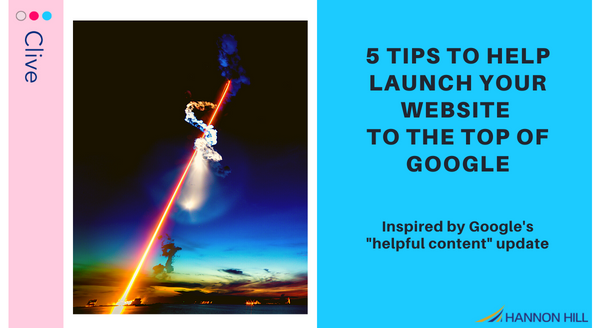
Google announced the newest updates to its search engine algorithm last week and provided some helpful tips content creators should know about.
Welcome to Google's Helpful Content Update.
The release is part of a broader effort to ensure audiences receive the most helpful and original information when utilizing Google's search engine.
The central theme of the update revolves around people-focused content.
Some marketers get carried away trying to outsmart the search engine algorithm by cramming an unhealthy amount of keywords into their copy to improve search rankings.
Others rely on AI copywriting tools to do the heavy lifting of writing long-form blog posts. These tools collect information from already existing websites, thus lacking originality.
At Google's recommendation, drop the "engine first approach". Google's systems identify low-value posts and articles with clickbait headlines that leave visitors searching for better information after stopping by a half-baked site.
To avoid a dip in Google rankings and slip beyond page one into the abyss, follow the five helpful tips below to get your website in front of audiences that need your insights this Fall:
1) Know your AudienceUnderstanding who your audience is and what they are looking for is the main criteria for reaching a particular group on the web. If you don't know your audience, you won't know what they need. And if you don't know what they need, your content will drift aimlessly like a ship without a sail.
However, if you know your audience, you can segment them and build personas that help create an effective content marketing campaign with a deserved ROI.
2) Utilize SEO best practicesStaying with the theme of "people-focused" content, it's vital that your website is SEO optimized. To do so, think about the user experience. Ensure your site loads quickly to avoid high bounce rates from individuals with an ever-decreasing attention span, which has dipped even more since the start of the pandemic.
Be sure to match a user's search intent and deliver what your audience wants to see through keyword research. To know which keywords to target, refer back to the personas created above and target them based on their interests through the help of keyword research tools.
3) Personalize the experienceYou have identified your audience, optimized your website to provide a satisfying experience, and used relative keywords to help people find you. Now it's time to tailor your content according to the visitor's interests.
Hannon Hill's Clive personalization tool works wonders when creating a targeted and relevant visitor experience that yields the results you want. In this age of digital personalization, you can't afford to show the same content to all visitors every time they're on your site.
4) Stay nicheGoogle stresses the importance of staying within your industry lane when sharing content on the web. Avoid writing about trending topics that have nothing to do with your specialization in the hopes of attracting attention.
Marketing expert Seth Godin said it best:
"If you market to everyone, you market to no one."
Consistency is essential for content creators, and staying true to your subject matter expertise will establish you as the expert in your field, which brings us to our final point.
5) Become an expertThere are approximately two billion websites currently on the web, according to a report published by Statista. With the many options to choose from at the touch of a button, it's crucial to share first-hand experience with your audiences and a depth of knowledge they won't find anywhere else on the internet.
Many of Hannon Hill's customers are leaders in higher education, an industry filled with PhDs, researchers, and other subject matter experts. Utilize these resources to create primary research case studies to stand out amongst the crowd. But remember that your experts usually write on a level intended for peers. Think of your target audience and edit the content received down to a level that resonates with your visitors. And if you don't have access to a relevant expert, try crowdsourcing.
Wrap upGoogle is the most popular search engine ever, holding 83% of the market share. If you want people to find you on the web, you must abide by Google's guidelines and stay current with its updates to remain relevant.
You work hard on your content, and your audience deserves to learn more about your offerings, expertise, and thought-leadership. Follow the steps outlined above, and you'll be sure to get one step closer to ranking high on Google's search results pages.
Last Updated: Aug 30, 2022 11:00 AM